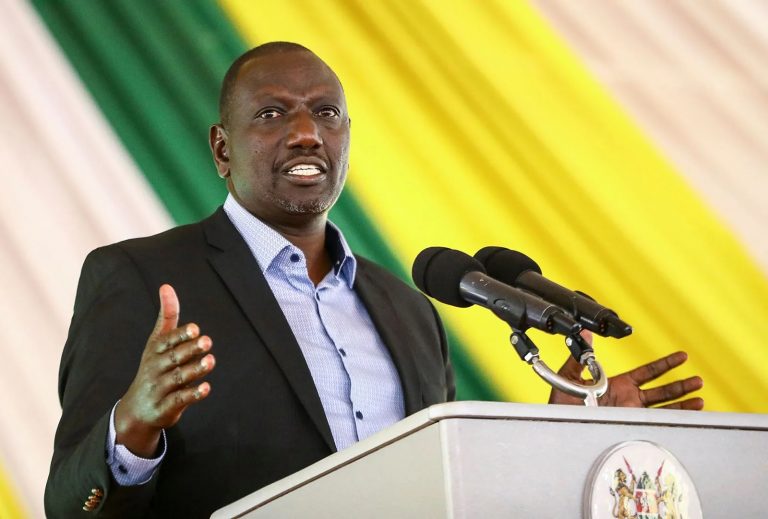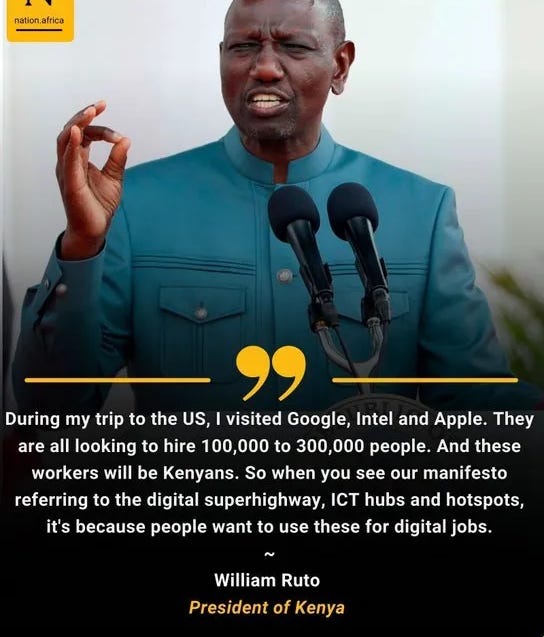
In a recent interview with the BBC, President William Ruto of Kenya revealed his ambitious plan to create millions of digital jobs for the youth in his country. He said that he has been in talks with some of the world’s leading tech companies, such as Apple, Google and Intel, to invest in Kenya and provide training and employment opportunities for the young generation.
Digital transformation is the process of using technology to improve the efficiency, effectiveness and accessibility of various services and sectors. It is a key component of Ruto’s vision for Kenya, as he aims to create a more prosperous, inclusive and innovative nation. In this blog post, we will explore some of the benefits of Ruto’s digital transformation agenda to Kenyans.

President Ruto said that he believes that Kenya has the potential to become a hub for innovation and technology in Africa, and that he wants to harness the talent and creativity of the Kenyan people. He said that he has been inspired by the success stories of other African countries, such as Rwanda and Ghana, that have embraced digital transformation and attracted foreign investment.
Register for Tekedia Mini-MBA edition 19 (Feb 9 – May 2, 2026): big discounts for early bird.
Tekedia AI in Business Masterclass opens registrations.
Join Tekedia Capital Syndicate and co-invest in great global startups.
Register for Tekedia AI Lab: From Technical Design to Deployment (next edition begins Jan 24 2026).
One of the main benefits of digital transformation is that it can enhance the delivery of public services, such as health, education, agriculture and security. By leveraging technologies such as cloud computing, artificial intelligence, blockchain and internet of things, Ruto plans to improve the quality, affordability and availability of these services to all Kenyans. For example, he intends to implement a universal health coverage scheme that will use digital platforms to register, verify and monitor beneficiaries, as well as to facilitate payments and claims.
He also wants to digitize the education system by providing online learning materials, digital libraries and smart classrooms. Additionally, he aims to modernize the agriculture sector by using drones, sensors and big data to optimize crop production and market access. Furthermore, he hopes to enhance the security and safety of Kenyans by deploying smart surveillance systems, biometric identification and e-government services.
Another benefit of digital transformation is that it can boost the economic growth and development of Kenya. By embracing technology, Ruto wants to create a more competitive, productive and diversified economy that can generate more jobs, income and opportunities for Kenyans. He envisions a digital economy that will support various sectors such as manufacturing, tourism, trade and finance. For instance, he plans to establish a digital industrial park that will host local and international technology companies and startups.
He also intends to promote digital tourism by creating online platforms that will showcase Kenya’s attractions and culture. Moreover, he aims to facilitate digital trade by simplifying customs procedures and reducing transaction costs. Additionally, he hopes to foster digital finance by enabling mobile money interoperability and expanding financial inclusion.
A third benefit of digital transformation is that it can foster social cohesion and empowerment among Kenyans. By adopting technology, Ruto wants to create a more connected, informed and engaged society that can participate in decision-making and governance processes. He believes that digital transformation can enhance democracy, transparency and accountability in Kenya. For example, he proposes to use social media and other online platforms to communicate with Kenyans and solicit their feedback on various issues. He also plans to implement an e-voting system that will allow Kenyans to cast their ballots electronically. Furthermore, he aims to empower marginalized groups such as women, youth and persons with disabilities by providing them with digital skills, tools and opportunities.
Apple is looking for senior software engineers to work on its iCloud platform. You will be responsible for designing, developing and maintaining scalable and reliable cloud services that power millions of devices and applications. You should have at least five years of experience in developing distributed systems using Java, C++, Python or similar languages, as well as a strong knowledge of cloud computing technologies, such as AWS, Azure or GCP.
Google is seeking data scientists to join its Google Cloud team. You will be working on cutting-edge projects that leverage Google’s massive data and computing resources to solve real-world problems for customers and partners. You should have a PhD or equivalent degree in computer science, statistics, mathematics or a related field, as well as a proven track record of conducting original research and publishing papers in top-tier journals or conferences.
Intel is hiring product managers to lead its artificial intelligence (AI) products portfolio. You will be defining the vision, strategy and roadmap for Intel’s AI products, such as processors, accelerators, software frameworks and tools. You should have at least three years of experience in product management or related roles, as well as a deep understanding of AI technologies, markets and trends.
Ruto said that he is aware of the challenges and risks that come with digitalization, such as cybercrime, data privacy and digital divide. He said that he is committed to ensuring that the digital economy is inclusive, secure and sustainable, and that he will work with the relevant stakeholders to develop policies and regulations that protect the rights and interests of the citizens.
President Ruto said that he hopes that his vision for a digital Kenya will inspire other African leaders to follow suit and join the global digital revolution. He said that he is confident that by working together, Africa can achieve its full potential and become a force for good in the world.



